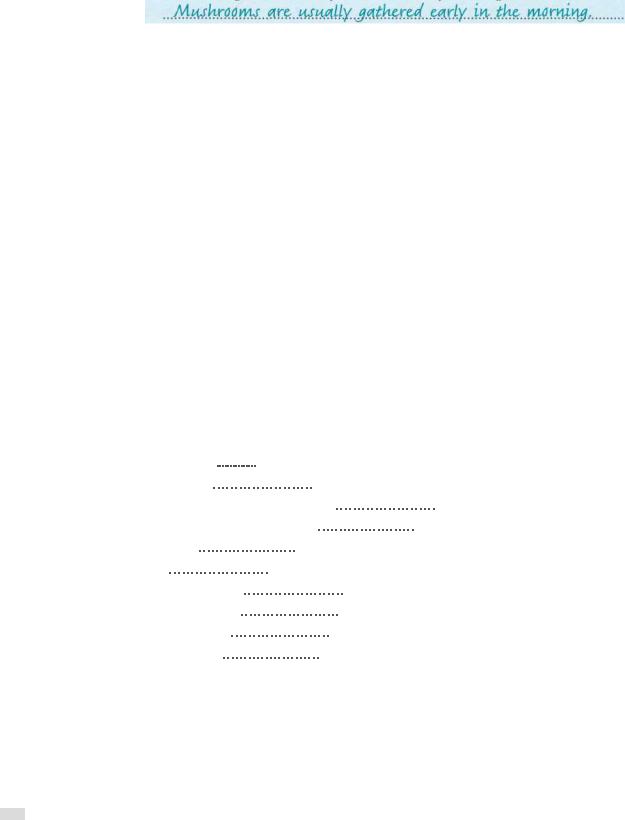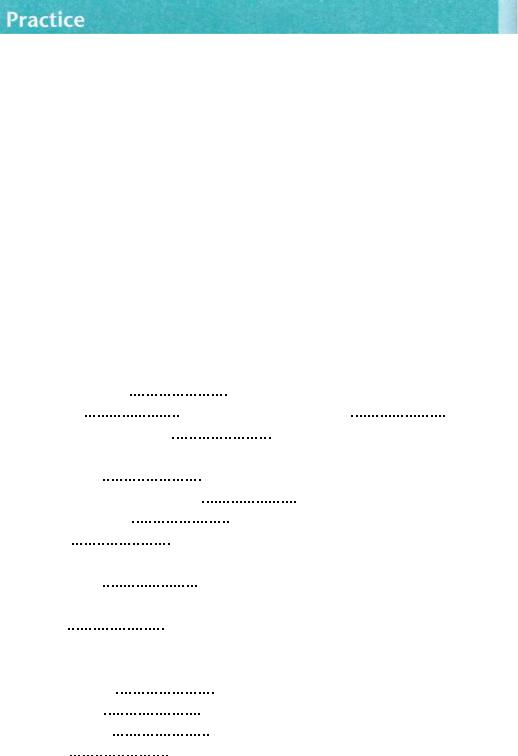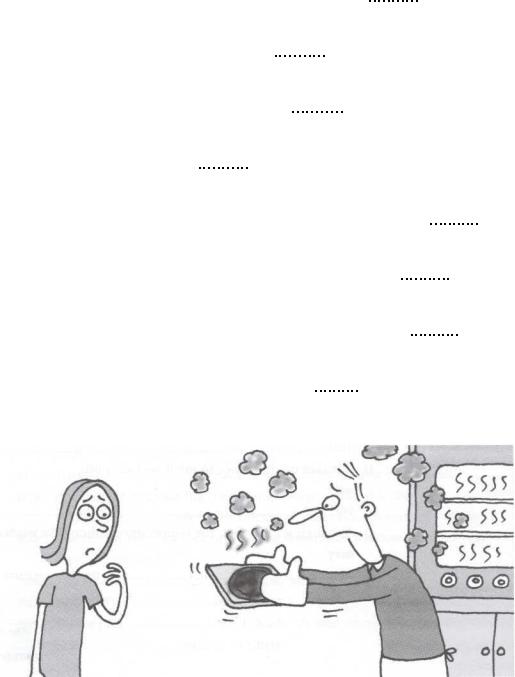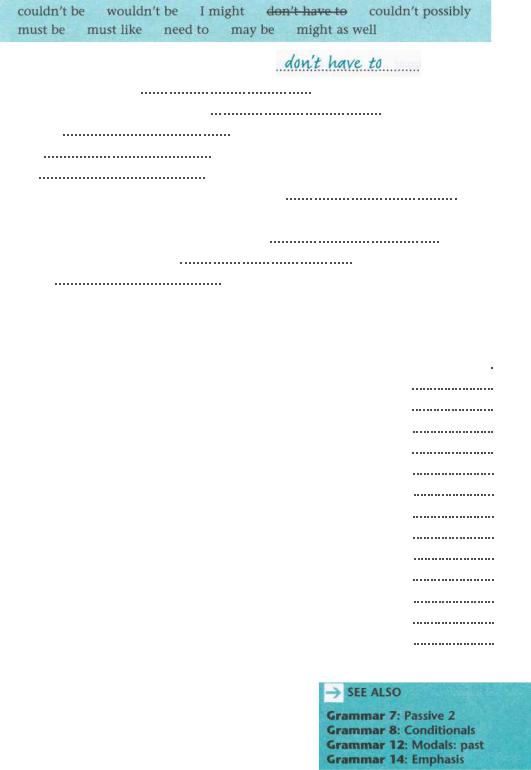
3_Macmillan_-_Advanced_Language_Practise
.pdf
A D V A N C E D LANGUAG E PRACTICE
4Rewrite each sentence in the passive, omitting the words underlined.
a)Mushroom-gatherers usually work in the early morning.
b)It's time the government brought the economy under control.
c)A thief stole several coats from the cloakroom.
d)The management has decided to reduce the workforce by 10%.
e)The decorators only took a day to do our house.
f)They have no idea what caused the accident.
g)You have to make an application for a visa in advance,
h)Ticket collectors work on the train on this line.
i)Lots of people had left their luggage on the platform,
j)A person directed Sally to the wrong address.
5 Complete each sentence with one appropriate word.
a) |
...be |
that as it may, it is still no excuse. |
|
b) |
Graham |
his car towed away by the police. |
|
c) |
I am going to call the police |
you leave at once. |
|
d) |
I think it's high time you |
taking yourself seriously. |
|
e) |
If you |
to think of moving, we could offer you a job. |
|
f) |
I |
you can come to my birthday party. |
|
g) Just imagine! |
|
they told you that you had won first prize! |
|
h) I wish Harry |
see the children now! |
||
i) |
If only you |
just stop talking for a moment and try listening! |
|
j) |
It was not |
necessary to call the fire-brigade. |
|
62

G R A M M AR 10 CONSOLIDATIO N 2
6 Put each verb in brackets into the appropriate verb form.
a)I don't like this restaurant, I wish we had  (go) to the Taj Mahal'.
(go) to the Taj Mahal'.
b) |
It's time something |
(do) about this problem. |
c) |
The late Prime Minister is said |
(be) difficult to |
|
work with. |
|
d) That was lucky! If I |
(catch) this bus, I |
|
|
(meet) you. |
|
e) Your order |
(deal) with at the moment. |
|
f) |
But for Pauline, I |
(not/pass) the exam. |
g) All dishes |
(serve) with French fries and a green |
|
|
salad. |
|
h) |
The house is thought to |
(sell) recently for a |
|
million pounds. |
|
i) |
If only I |
(study) more when I was at school. |
j) |
If I were |
(tell) you where the treasure is, what |
|
would you do? |
|
7 Put each verb in brackets into an appropriate verb form.
a) |
The second film we saw |
|
|
(direct) by Howard Hughes. |
b) |
If I |
(know) that you |
|
(arrive) on that |
|
train, I |
(come) to meet you. |
||
c) |
I wish you |
(not/eat) all the food! I'm hungry! |
||
d) |
Be careful! If you |
|
(tease) the cat it |
|
|
(scratch) you! |
|
|
|
e) |
Thanks very much! If you |
|
(not/help) me, we |
|
|
(not/finish) the work so quickly. |
|||
f) |
Hurry up, or all the best seats |
|
(take). |
|
g) |
What a shame that it |
|
|
(decide) to cancel the school play! |
h) |
Carol now wishes she |
|
|
(marry) in a church. |
i) |
If it |
(not/be) for you, I |
(still/be) in |
|
|
prison today! |
|
|
|
j) |
Unfortunately, tomorrow's match |
|
(call off). |
|
63

A D V A N C E D LANGUAG E PRACTIC E
8Complete the second sentence so that it has a similar meaning to the first sentence, using the word given. Do not change the word given.
a)I'll get someone to press your trousers, sir.
pressed
I'll  immediately, sir.
immediately, sir.
b)Everyone knows that taking exercise is good for your health.
|
known |
|
|
Taking exercise |
good for your health. |
c) |
Someone has suggested the resignation of the minister. |
|
|
that |
|
|
It |
the minister should resign. |
d) |
They've asked me if I would chair the meeting. |
|
|
to " |
|
|
I |
chair the meeting. |
e)We have managed to account for all the missing papers. successfully
All the missing papers |
for. |
f)Since Sue left for Glasgow, nobody has seen anything of her. of
Nothing has |
she left for Glasgow. |
g) I'd rather you didn't sit at the back of the room please. |
|
it |
|
I'd prefer |
at the front of the room. |
h) A traffic warden showed me how to get to the museum. |
|
way |
|
I was |
to the museum by a traffic warden. |
i)John's school is making him sit his exams again. made
John |
sit his exams again. |
j) I should really be starting my homework. |
|
time |
|
It's |
starting my homework. |
64

Don't have to and
must not
Should
Could
Explanations
•Don't have to refers to an absence of obligation.
You don't have to work tomorrow.
•Must not refers to an obligation not to do something.
You must not leave the room before the end of the test.
Where *should appears, ought to can also be used.
•Expectation
This film *should be really good.
•Recommendation
I think you *should talk it over with your parents.
In writing, should can be used to express a strong obligation politely.
Guests should vacate their rooms by midday.
• Criticism of an action
You *shouldn't eat so much late at night.
• Uncertainty
Should I leave these papers on your desk?
•Should and verbs of thinking
Should is often used with verbs of thinking, to make an opinion less direct.
I should think that model would sell quite well.
•With be and adjectives describing chance
This group of adjectives includes odd, strange, funny (=odd) and the expression
Whata coincidence.
It's strange that you should be staying in the same hotel!
•After in case to emphasise unlikelihood
I'm taking an umbrella in case it should rain.
See Grammar 8 for similar uses in conditional sentences.
•Could is used to express possibility or uncertainty.
This could be the house.
•Could is used with comparative adjectives to express possibility or impossibility.
The situation couldn't be worse.
It could be better.
65
A D V A N C E D LANGUAG E PRACTIC E
|
• Could is used to make suggestions. |
|
We could go to that new restaurant opposite the cinema. |
|
• Could is used to express unwillingness. |
|
/ couldn't possibly leave Tim here on his own. |
Can |
• Can with be is used to make criticisms. |
|
You can be really annoying, you know! |
|
• Can is also used with be to refer to capability. |
|
Winter here can be really cold. |
Must and can't |
These refer to present time only. (See bound to). In expressing certainty, they are |
|
opposites. |
|
This must be our stop. (I'm sure it is.) |
|
This can't be our stop. (I'm sure it isn't.) |
May and might |
• May can be used to express although clauses: |
|
She may be the boss, but that is no excuse for shouting like that. |
|
See also Grammar 14 Emphasis. |
|
• May/might as well |
|
This describes the only thing left to do, something which the speaker is not |
|
enthusiastic about. |
|
Nobody else is going to turn up now for the lesson, so you may as well go |
|
home. |
•May and might both express possibility or uncertainty. May is more common in formal language.
The peace conference may find a solution to the problem.
|
• There is an idiomatic expression with try, using may for present reference, |
|
and might for past reference. |
|
Try as I might, I could not pass my driving test. |
|
(This means although I tried hard, I could not pass my driving test.) |
Shall |
• Shall can be used with all persons to emphasise something which the speaker |
|
feels is certain to happen or wants to happen. |
|
/ shall definitely give up smoking this year. |
|
We shall win! (shall is stressed in this sentence) |
|
• Similarly, shall is used in formal rules and regulations. |
|
No player shall knowingly pick up or move the ball of another player. |
Will |
• Will can be used to express an assumption. |
|
A: The phone's ringing. B: That'll be for me. |
66
G R A M M AR 11 MODALS : PRESEN T AND FUTURE
• Will/won't can be used emphatically to tell someone of the speaker's intention, or to forbid an action, in response to a will expression.
|
|
/'// take the money anyway, so there! |
|
|
You won't! |
|
|
I will! |
|
|
Similarly / won't can mean / refuse, and / will can mean / insist. |
|
|
A: I won't do it! B: Yes, you will! |
Would |
Would is often used in situations where a conditional sense is understood but |
|
|
not |
stated. |
|
|
Nobody would agree with that idea, (if we asked them) |
|
|
Life wouldn't be worth living without you. (if you weren't there) |
|
|
/ think Jim would be the best candidate, (if he was under consideration for |
|
|
the job) |
|
|
Sue wouldn't do that, surely! (if you think she's capable of doing that). |
Need |
• |
Need to is a modal auxiliary, and behaves like a normal verb. |
|
|
Do you need to use the photocopier? |
|
• |
Need is a modal auxiliary, but mainly in question and negative forms. |
|
|
Need you make so much noise? |
|
|
See Grammar 7 for need doing |
Related |
• |
Had better |
non-modal |
|
This is a recommendation and refers only to the present or future. |
expressions |
|
You'd better notphone her again. |
|
• |
Be bound to |
|
|
This makes a future prediction of certainty. |
|
|
It's bound to rain tomorrow. |
67

A D V A N C E D L A N G U A G E PRACTIC E
1Underline the correct word or phrase in each sentence.
a)I don't think you could/should tell anyone yet.
b)I couldn't/shouldn't possibly leave without paying.
c)That mustn't/can't be the hotel Jane told us about.
d)There are times when the traffic here can/could be really heavy.
e)We are enjoying our holiday, though the weather could/must be better.
f)You couldn't/shouldn't really be sitting here.
g)You could/may be older than me, but that doesn't mean you're cleverer,
h)You might/should like to look over these papers if you have time.
i)I'm afraid that nobody should/would help me in that kind of situation,
j)No member of the association must/shall remove official documents from these premises without written permission.
2Put one suitable word in each space. Contractions (can't) count as one word.
Bill: This (1)  be the house, I suppose, number 16 Elland Way. Jane: I pictured it as being much bigger, from the estate agent's description.
be the house, I suppose, number 16 Elland Way. Jane: I pictured it as being much bigger, from the estate agent's description.
Bill: |
Well, we'd (2) |
|
go inside. |
|
Jane: We (3) |
as well. Wait a minute. I (4) |
to just |
||
|
find my glasses. I (5) |
see a thing without them. |
|
|
Bill: I don't think much of it from the outside, to be honest. |
|
|||
Jane: Yes, it (6) |
certainly do with a coat of paint or two. |
|
||
Bill: |
Rather you than me! I (7) |
like to have to paint it all! And |
||
|
the gutters (8) |
|
replacing. |
|
Jane: I (9) |
think they haven't been replaced since the house was |
|||
|
built. |
|
|
|
Bill: |
They (10) |
really be replaced every four years ideally. |
||
Jane: And I don't like that big ivy plant growing up the side. Ivy |
|
|||
|
(11) |
get in the brickwork and cause all sorts of damage. |
||
Bill: I wonder if there's a lock on that big downstairs window? It looks very easy to break in to.
Jane: There's (12)
Bill: Well, (13) Jane: Do we (14) (15)
68

G R A M M A R 11 MODALS: PRESENT AND FUTURE
3Complete the second sentence so that it has a similar meaning to the first sentence, using the word given. Do not change the word given.
a)I couldn't be happier at the moment.
could
I am as  at the moment.
at the moment.
b)Although I tried hard, I couldn't lift the suitcase.
might |
|
Try |
, I couldn't lift the suitcase. |
c) I'm sure that Peter won't be late. |
|
bound |
|
Peter |
on time. |
d)Fancy you and I having the same surname! should
|
It's odd |
the same surname! |
e) |
I think you should take up jogging. |
|
|
were |
|
|
If I |
take up jogging. |
f) It's possible that this kind of snake is poisonous. |
|
|
|
could |
|
|
This snake |
the poisonous kinds. |
g) |
You can't borrow my car! |
|
|
won't |
|
|
I |
borrow my car! |
h)I'm sure this isn't how you get to Norwich! can't
This |
way to Norwich! |
i)It makes no difference to me if we call it off. may
We |
call it off. |
j) Although it's summer, the temperature is more like winter. |
|
may |
|
It |
the temperature is more like winter. |
69

A D V A N C ED LANGUAG E PRACTICE
4Choose the sentence A or B that is closest in meaning to the sentence given.
a)It's possible that we'll know the answers tomorrow. ...A.,...
A We may know the answers tomorrow. B We should know the answers tomorrow.
b)I don't think you should ring him now. It's rather late
A You might not ring him now. It's rather late.
B You'd better not ring him now. It's rather late.
c)You needn't come if you don't want to A You won't come if you don't want to.
B You don't have to come if you don't want to.
d)I think it's wrong for you to work so hard
A You don't have to work so hard.
B You shouldn't work so hard.
e)Perhaps these are the keys A These might be the keys. B These must be the keys.
f)It would be wrong for us to lock the cat in the house for a week A We'd better not lock the cat in the house for a week.
B We can't lock the cat in the house for a week,
g)Ifs possible that the decision will be announced next week
A The decision might be announced next week.
B The decision will be announced next week,
h)Although I try hard, I can never solve The Times' crossword A Try as I may, I can never solve 'The Times' crossword.
B Try as I can, I may never solve 'The Times' crossword.
i)I know. Why don't we go out to eat instead? A I know. We must go out to eat instead.
B I know. We could go out to eat instead.
70

G R A M M AR 11 MODALS: P R E S E N T AND FUTURE
5 Complete each sentence with one of the phrases from the box.
a) The heating comes on automatically. You |
turn it on. |
||
b) Of course I'll help! I |
let you do it on your own. |
||
c) |
It's a lovely hotel. And the staff |
more helpful. |
|
d) George |
it there if he has stayed there for so long. |
||
e) You |
right, but I'm still not convinced. |
||
f) |
We |
go in this museum. There's nothing else to do. |
|
g) |
I love these trees. Without them the garden |
the |
|
|
same. |
|
|
h) There's the phone call I was expecting. It |
George. |
||
i) Thanks. And now you just |
|
sign on the dotted line. |
|
j) |
Try as |
, I simply couldn't open the lid. |
|
6In most lines of this text there is an extra word. Write the word, or put a tick if the line is correct.
I may as well be admit it - I'm a secret admirer of all things connected |
1 ...be |
|
with trains! It's not with something you would want to admit to your |
2 |
|
friends, but I can't imagine life possibly without my collection of model |
3 |
|
trains and train memorabilia. You're probably thinking I must be done |
4 |
|
some kind of nerd who stands around on chilly platforms all day |
5 |
|
collecting train numbers, and yes, I have to admit for I've done my fair |
6 |
|
share of that, but that's only a small part of it. I can just love the feel of |
7 |
|
railway stations, and I can cheerfully spend a whole of afternoon in |
8 |
|
one, just walking around soaking up to the atmosphere of the place, |
9 |
|
looking for things for my collection, and taking photos of new engines. |
10 |
|
Call me might a wierdo, but I'd far rather spend a day in a station |
11 |
|
than on the beach by sunning myself. I'd be too busy taking the train |
12 |
|
down the coast - coastal routes can be an absolutely spectacular. |
13 |
|
There's a convention for those railway lovers on the south coast soon |
14 |
|
- rest assured that I shall be there. I wouldn't miss it for all the world! |
15 ... |
|
71
